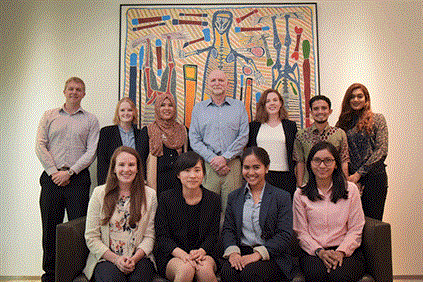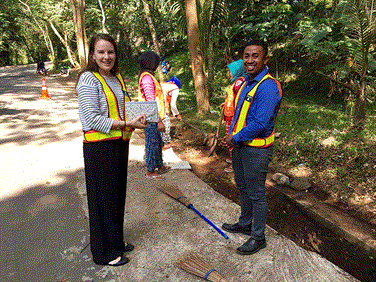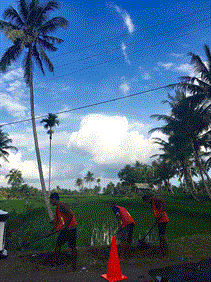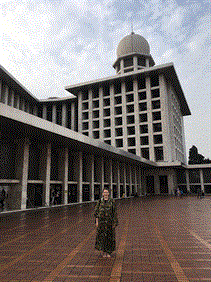LKY Funded Internship Report
Elizabeth Banerd
July 2017
In June and July 2017, I completed an internship at the Australian Embassy in Jakarta, Indonesia. I was placed within the Economic Governance Unit, and was tasked with activities relating to the management of Australia’s aid programs in Indonesia.


In undertaking an internship at the Australian Embassy in Jakarta I set myself two challenges. To experience living and working in an unfamiliar country and culture, and to experience working in the Australian foreign service. This was a litmus test, to either confirm or deny my suspicions that I could possibly really enjoy both these activities. My two months in Indonesia taught me a great deal, and happily, confirmed rather than reshaped my interests.
Professionally, my internship reinforced the pertinence of my studies at the Lee Kuan Yew School. Having taken pains to brush up on my contextual knowledge reading about Australia’s foreign policy, the Indonesian political system, and everything in between, I found that the skills I actually called into use in my work were much more subtle. They were, of course,skills learned in the classroom but not perhaps of the most obvious type. Rather than regressions or historic facts, I found myself reminded of the importance of communication and writing, quality monitoring and evaluation, and working through problems in logical sequences. And, of course, I was reminded daily of the commitment to public service excellence,as is common to both the Lee Kuan Yew School and the Australian Foreign Service.
The experience also reminded me of the value of a policy degree. After studying International Studies and Law in my undergrad, I looked to the MPP for a toolkit. I was looking to sharpen my analytical, evaluation, and communication skills in order to be a valuable and adaptable employee. Theoretical knowledge can be learned in many ways reading and immersing oneself in the subject matter being chief among them but I was looking for the generalist training that would allow me to look at issues, be they in foreign aid, in development policy, or in diplomacy, and to think through the issue in a logical way, to conduct research and extract relevant information, and to communicate my findings in a way that is useful to decision makers, stakeholders, and implementers. I feel that my first year at LKYSPP has helped me to sharpen my toolbox, and I felt equipped to face the challenge of this internship thanks to these skills.
My day to day work at the Embassy began in the deep end of the pool right at the end of the financial year. This entailed a large amount of reporting and budgeting processes, as well as the negotiation of new contracts and work plans with program partners for the next program cycle. This was a fascinating process, and it allowed me to actively contribute to the program management cycle at its busiest time, while getting a great introduction to the monitoring and evaluation processes in place.
During my time there the team was struggling with how to incorporate more gender outcomes into the program. This was a great example of a policy challenge, as the program found that it came up against various barriers to gender equity in the economic and financial arena in Indonesia, as well as various institutional barriers within the program and the service. Identifying possible intervention points and changes to program design and evaluation to meet this goal was a rewarding project, and one that reinforced my desire to work to strengthen gender equity in the policy sphere.


The negotiation of new work contracts was also a challenge, and allowed me to play the mediator in examining proposals and finding areas where concessions could be made to meet the goals of the program while still representing good value, sustainable investments for Australia. The sheer quantity and visibility of Australian aid in Indonesia added a further dimension to this work, and made transparency and rigour even more crucial. The internship then concluded with a site visit in the beautiful Nusa Tenggara Barat to see Australian aid in action. Suffice to say that there are perhaps worse ways to end an internship than by discussing transparency in aid programming beachside in Lombok!

The greatest joy of the internship, however, was a personal one. Living in Jakarta was equal parts frustrating and rewarding. While the city has a reputation for traffic, pollution, and lack of green spaces, it was also a city of great food, of kind people, and of a fascinating cultural mélange. The daily victories of learning Bahasa, of finding my way around the laneways and snaking traffic, and of learning the customs and habits of locals became an addiction –and reminded me of the joy of learning a new city and a new culture. This experience recalled my previous sojourns abroad, and how much importance I place on the qualities of adaptability and cultural ambiguity. Living in Indonesia reminded me that living in a diverse, vibrant, international environment is a personal goal –and one that starts at LKYSPP, but certainly will not end there.

